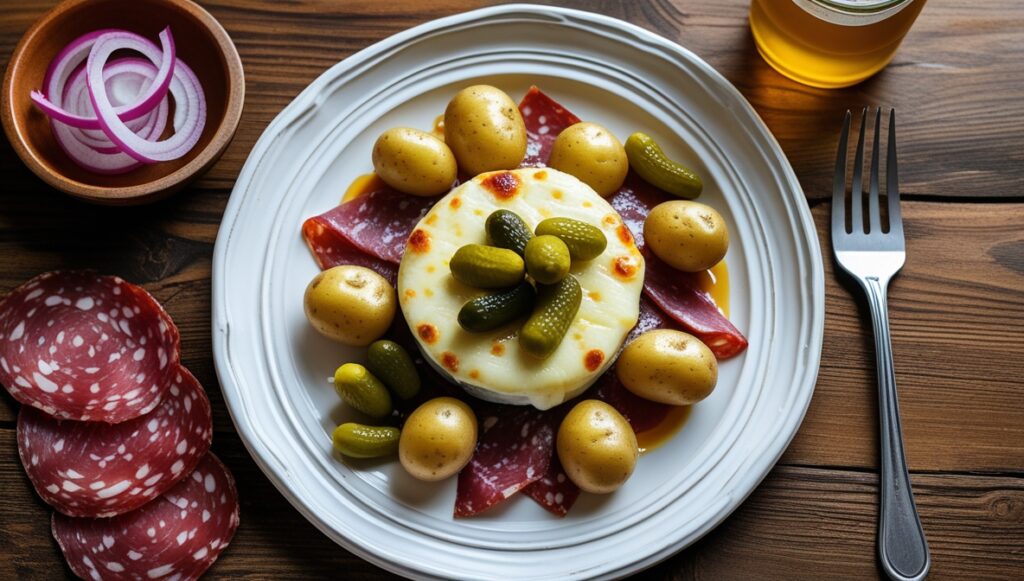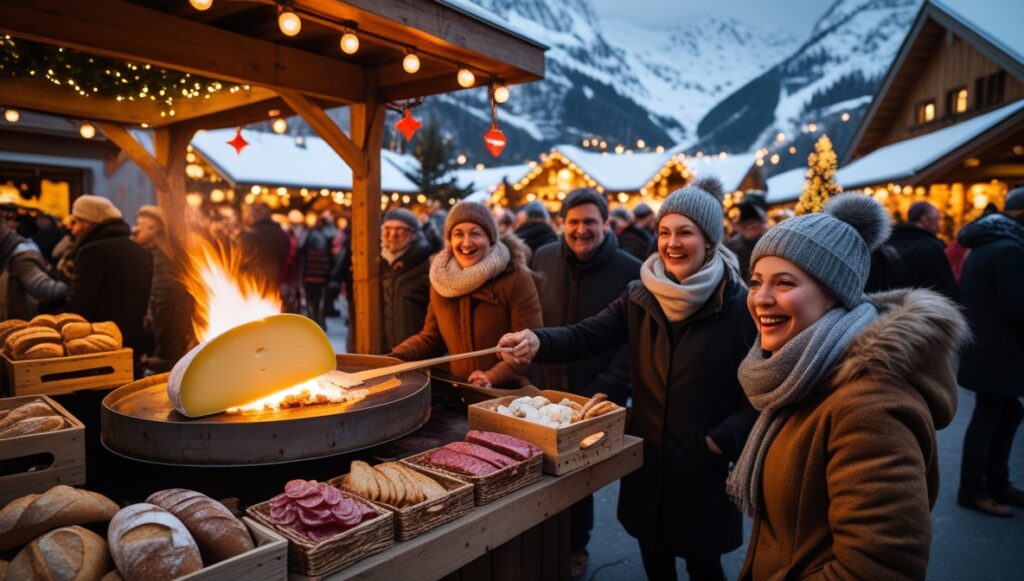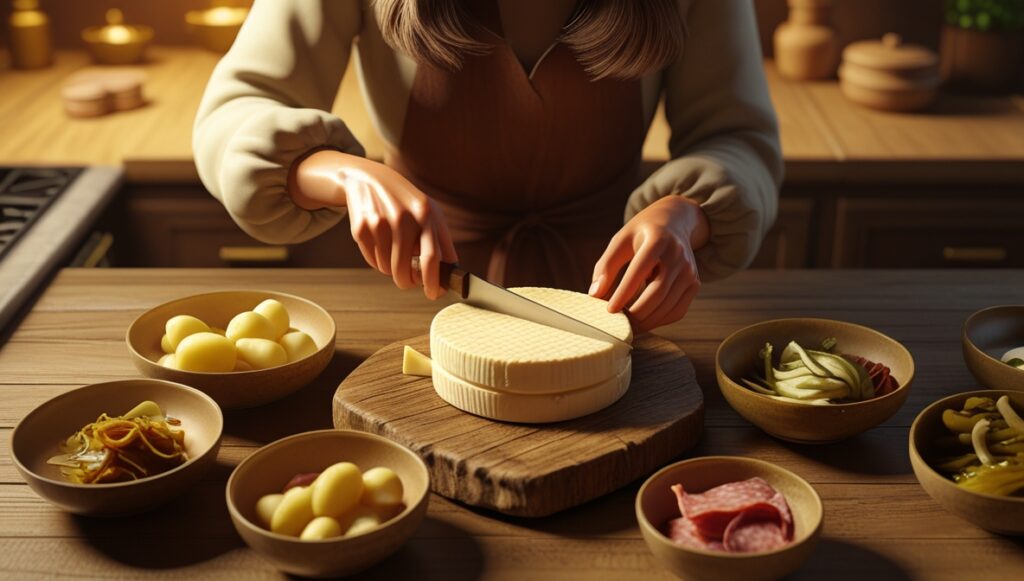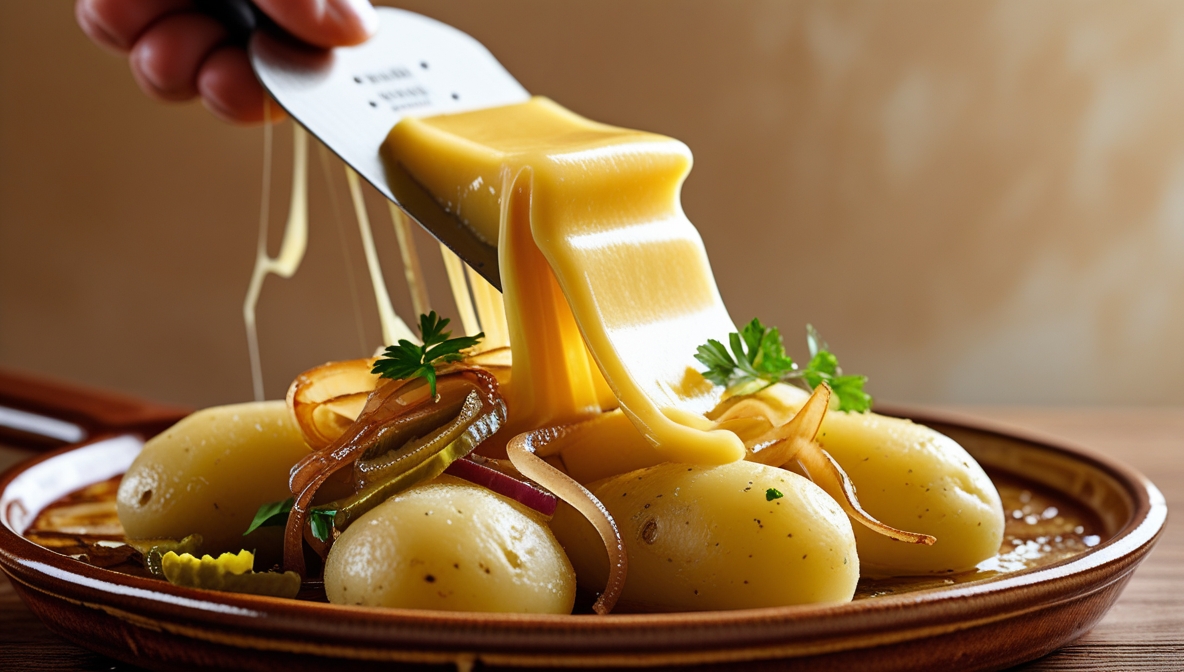Introduction
Golden, gooey, and deeply comforting, this traditional Raclette is more than just a meal—it’s a cultural experience. Originating from the Alpine regions, this melted cheese delight has warmed Swiss hearts for centuries. Whether served in mountain chalets or city restaurants, it symbolizes communal dining and the essence of traditional Switzerland food. Its simple yet satisfying richness has earned it a place at winter gatherings, festive holidays, and cultural celebrations.


History & Cultural Significance
Dating back to medieval times, Raclette was first enjoyed by peasants in the Valais region. Shepherds would melt cheese over open fires and scrape it onto bread or potatoes. The name comes from the French word racler, meaning “to scrape.”
Today, Raclette is cultural icon in both French- and German-speaking cantons. It’s commonly served during Swiss National Day, Christmas markets, and ski lodge feasts. It embodies togetherness and Alpine tradition—making it one of the most famous foods in Switzerland.
Ingredients & Regional Variations
Key Ingredients:
Semi-hard cow’s milk cheese (specifically made for melting)
Boiled potatoes
Pickled onions and cornichons
Cured meats like prosciutto and salami
Mild spices such as paprika or nutmeg
Regional Variations:
Valais-style: Melting half a wheel over a fire
Modern tabletop grills: Found across Switzerland
Ticino twist: Includes grilled veggies or polenta
Global adaptations: Featuring cheddar, mushrooms, or spicy sausage
Cooking Process & Difficulty Level

Difficulty: Beginner-friendly
How to Make It at Home:
Boil potatoes with skin on.
Heat cheese using a tabletop grill or broiler.
Scrape melted portions onto your plate.
Serve with pickles, cured meats, and light seasoning.
Tips:
Use high-quality cheese
Serve ingredients warm
Preheat the cheese for faster melting
Where to Eat Raclette in Switzerland
Wondering where to eat Raclette while visiting? Check out these top spots:
Restaurant du Vieux-Valais (Zermatt) – Cozy Alpine vibes
La Cave Valaisanne (Geneva) – Authentic Valais-style experience
Chez Vrony (Zermatt) – Michelin-recommended with stunning views
Le Gruyèrien (Fribourg) – Homestyle atmosphere
Christmas Markets – Try it in Zurich, Lucerne, or Basel
Drink Pairings & Side Dishes
Drink Pairings:
Dry white wines like Fendant or Riesling
Herbal teas like peppermint
Sparkling water or light beer
Side Dishes:
Green salads with vinaigrette
Roasted vegetables
Country-style bread
Apple slices for a sweet contrast
Fun Facts & Lesser-Known Trivia
The cheese used is specially made for melting—creamy, not stringy
It’s considered a national dish along with fondue
Some wheels can weigh over 6 kg (13 lbs)
Even celebrities like Roger Federer adore it
Health Benefits & Nutrition
Nutritional Benefits:
Rich in protein and calcium
Contains B12 and phosphorus
Diet-Friendly Options:
Vegan: Use plant-based cheeses
Gluten-Free: Naturally so
Keto: Skip the potatoes, keep the cheese, meats, and veggies
Best Raclette Recipe at Home
Ingredients:
500g semi-hard Swiss cheese (sliced)
12–15 baby potatoes
Pickled onions and cornichons
Cured meats
Paprika or black pepper
Steps:
Boil potatoes until tender.
Prepare a serving platter with all side ingredients.
Melt cheese on a tabletop grill.
Scrape over potatoes and toppings. Season and serve.
Global Influence & Fusion Cuisine
Beyond Switzerland, the dish is gaining fame worldwide:
Featured in food festivals in Tokyo, NYC, and Berlin
Used in burgers, loaded fries, or even nachos
Loved for its heartiness and versatility compared to fondue
Comparison with Similar Dishes
When comparing this Swiss favorite to other cheesy classics, it stands out. Fondue is a shared experience, where bread is dipped in communal cheese. Mexico’s queso fundido blends melted cheese with chorizo, eaten with tortillas. The UK’s Welsh rarebit is a tangy cheese sauce over toast, while France’s aligot offers a stretchy mix of mashed potatoes and cheese. Each is delicious, but Switzerland’s gooey treasure holds its own in the world of cheese-lovers.
Whether you’re enjoying it in a ski chalet or your kitchen, this dish brings people together in the most flavorful way. Dive into one of the most famous foods in Switzerland, and discover why it’s earned a spot in the hearts of food lovers worldwide.

